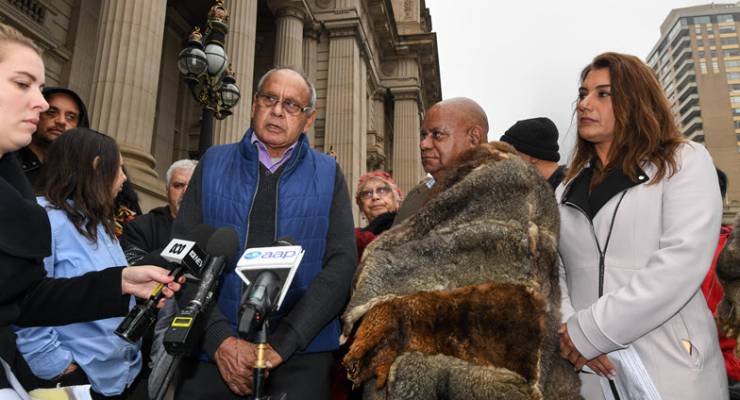
In July, Victorian Parliament passed Australia’s first ever treaty legislation with the support of the crossbench. This entrenched a process that, while not widely publicised, may be Premier Daniel Andrews’ most progressive and historic political move.
Andrews has said a re-elected Labor government will continue the treaty process with hopes that the proposed Aboriginal Representative Body will be established by July 2019. Opposition leader Matthew Guy has made it clear that a Coalition government will seek to end the treaty process.
But where do the micro-parties and independents — who might end up holding the balance of power in the upper house — stand on this issue?
Victorian Greens
Analysis is divided on the Greens’ potential to gain the balance of power in 2018. Strengthening the treaty process is a key element of the Greens 2018 campaign, due to the strong advocacy and influence of Greens spokesperson for Aboriginal Affairs MP Lidia Thorpe.
While the Greens have been called roadblocks for their nuanced policy on representation in treaty talks, Thorpe reminded Crikey that “in the last parliament, it was the Greens and other moderate crossbenchers that got the treaty legislation passed”.
Aware of the precariousness of the crossbench this election, Thorpe fears that Labor’s upper house preferencing of the Shooters, Fishers and Farmers over the Greens “could tip the balance in parliament, meaning progress on treaty could be halted or even wound back”.
Shooters, Fishers and Farmers
In 2018, the Shooters are looking to expand their numbers beyond their two upper house seats, fielding numerous candidates in both houses. The Shooters voted against the treaty bill however, in his contribution to the debate, MP Daniel Young indicated that the party may be willing to support future treaty talks if public access was guaranteed to state parks for recreational use, citing the restricted use of some areas resulting from native title or other agreements with Aboriginal groups. At time of publishing, neither Young nor the Victorian Shooters, Fishers and Farmers responded to requests to clarify their position.
Fiona Patten’s Reason Party
Reason’s single upper house vote was crucial in passing the treaty legislation. When asked for comment, leader Fiona Patten responded that she supports continuing a treaty process that “must be driven by Aboriginal people and recommended by the independent commission”.
“This is a historic moment in the history of our state and of our country.”
Vote 1 Local Jobs
Western Victoria MP James Purcell and his micro-party Vote 1 Local Jobs were instrumental in getting the treaty bill through the upper house. Purcell was the only member in either chamber who voted with the Greens on their amendments. In 2018, Purcell is running independently for the regional lower house seat South West Coast. Purcell did not respond to Crikey‘s request for comment.
Victorian Socialists
The Socialists have a real shot at gaining political representation for the first time, but they will be competing with Reason for upper house votes and Greens preferences. A spokesperson commented that it is Victorian Socialist Party policy to continue treaty and “support whatever demands Aboriginal people raise to make the treaty more meaningful, including sovereignty over land and self-determination of communities, reparations and compensation for the Stolen Generations, stolen wages and land theft”.
Animal Justice/Health Australia/Derryn Hinch’s Justice Party
As part of their #NoRacismInPolitics campaign, Colour Code surveyed parties running in Victoria, finding that Animal Justice Party and Health Australia both support a First Nations treaty led by First Nations peoples, while Liberal Democrats, Sustainable Australia and Democratic Labor Party were uncommitted.
Derryn Hinch’s Justice Party could not be reached for comment.
Independents
Dr Rachel Carling-Jenkins (formerly Liberal Democrats, then Australian Conservatives) voted against the treaty bill in the upper house and is seeking election as an independent member for Werribee. Her office did not respond to requests for comment.
Suzanna Sheed is seeking re-election as the member for Shepparton. Sheed contributed to the treaty bill and voted for it. Sheed told Crikey “the process towards self-determination and the Closing the Gap initiative has been disappointing to date in my opinion, as they have not achieved the aspirations of those involved. I support the current treaty process with Aboriginal Victorians and would continue to work with whoever forms government to pursue treaty and equip our Aboriginal community to be able to successfully drive the process.”
Former Moreland mayor Oscar Yildiz is running in Pascoe Vale, and passionately described to Crikey his wide-ranging support for Aboriginal treaties.
Jenny O’Connor is standing for Benambra and says she supports an Aboriginal treaty.
Ali Cupper is hoping to be elected in Mildura, and also supports continuing treaty in the next parliament.
Tracie Lund is one of several independents running for Morwell and is committed to continuing the treaty process. The incumbent independent (formerly Nationals) member for Morwell, Russell Northe, did not have to vote on treaty as the government had the numbers in the lower house. He declined to comment for this article.
Damien Cole is running in the surf coast seat of South Barwon and commented that he is committed to expanding the treaty process “with a very measured sensitivity towards the needs of different groups within the state, rather than just a blanket state treaty”.
Independent candidates Darryn Lyons and Tammy Atkins did not respond by deadline.







Crikey is committed to hosting lively discussions. Help us keep the conversation useful, interesting and welcoming. We aim to publish comments quickly in the interest of promoting robust conversation, but we’re a small team and we deploy filters to protect against legal risk. Occasionally your comment may be held up while we review, but we’re working as fast as we can to keep the conversation rolling.
The Crikey comment section is members-only content. Please subscribe to leave a comment.
The Crikey comment section is members-only content. Please login to leave a comment.